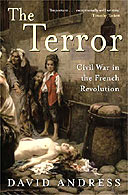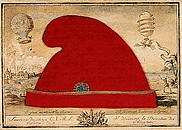Response Essay on the Terror Réplique
jeudi 5 octobre 2006Par David Andress, University of Portsmouth

My thanks for this opportunity to respond to reviews of my book, The Terror: Civil War in the French Revolution, London, Little Brown, 2005 (1). I shall direct most of my attention to the thoughtful observations of Jean-Pierre Gross in the AhRf, and with the implications of some of his queries, before reflecting on some of the other points that have been raised by reviews elsewhere. Gross poses the question of how we are to understand the Terror as “phénomène stricto sensu”, which left me wondering if I could actually define what that meant. I would certainly not go as far as some and make the Terror conterminous with the fall of the monarchy, as if all that followed was indiscriminate horror. But nor I think can one limit it to the sort of pure ideological drive that Patrice Gueniffey seems to make it, or again the limited, almost humanitarian braking of popular impulse to slaughter that Sophie Wahnich has constructed – wishing, it seems to me, to praise the historical Terror by comparison to an unrealised, worse one which might have been. Jean-Clément Martin’s recent book comes close to some of my own thoughts on the matter, though his suggestion that violence had really infused the whole political landscape by 1793 is a little too vaguely apocalyptic to have my complete agreement. Probably there should be no “The Terror”, and we might speak of “invocations of” and “impulses towards” such a concept, rather than framing it as if it were an official title – after all, as Martin reminds us, despite the rhetoric, Terror was not put “on the order of the day” on 5 September 1793. But we are often reminded these days that there was no “The Renaissance”, either, nor any “Middle Ages”. “The Enlightenment” did not happen per se, and we are far from being certain that there was ever “Modernity”. This very anti-nominalism can itself become a distraction – sometimes a label is just a label. The Terror, officially or not, is what most historians understand to be the period between mid-1793 and mid-1794. Whether that understanding encapsulates a sense of it as a process, a programme, or just a set of dates, will depend on always-questionable historiographical judgments.
Gross’s questions about my definition, as they develop, do expose points which merit discussion. In questioning the economic and social dimensions of “The Terror”, he reveals his own preference for separation between that label and others, such as the “pouvoir de réquisition exercé par le gouvernement révolutionnaire”, and the “effort de guerre”. One suspects therefore that for Gross, the Terror is only the active repression of the era. But I am not sure that this is a viable distinction to make. The journée of 5 September would not have happened, or at least not taken the form it did, if the sans-culottes and their political leadership had not been agitated over food-prices and supplies. One side of the response to this was the armées révolutionnaires, another was the growing emphasis on management of the food-supply, whether through the Maximum or through outright rationing. Both are authoritarian solutions to a social problem, both rest on coercive power. One was undoubtedly more obviously brutal, but as I ask in my book, would the other have worked as well as it did, where it did, if elsewhere more brutal means were not being used, and known about? Representatives-on-mission were given the same unlimited powers, and pressed with the same urgency to fulfil their tasks. Some were engaged in suppressing active rebellion, others in coaxing quiet areas into productivity. Does that mean that some were part of “The Terror” and some not? I do not think one can credibly make that claim, except of course by first defining “The Terror” as only those parts of the Republic’s activities you find distasteful, which is mere special pleading.
Likewise it is difficult to separate socially-radical aspirations and various forms of violence, a point on which Gross raises a somewhat inconclusive concern. Of course, for the true conservative, socially-radical aspirations are illegitimate in themselves, but that is the worst of all reasons for pretending that they can be entirely separated from a violence which is also seen as a priori illegitimate. Not only is it quite possible that it was only in a context of violence that thoroughgoing efforts at “égalitarisme civique” could be attempted, I would suggest it is quite likely that it was only in such a context that they could even have been imagined in the last decade of the eighteenth century as more than a utopian dream.
Turning to the wider field of reviews, I have noticed amongst some reviewers (particularly for reasons I do not wish to speculate on here, Americans) the apparent need to classify the Terror as something which must be either condemned or excused – a tendency which results, in the case of my book, in an assumption that because I do not condemn it unequivocally, I must be seeking to excuse it. This is a particularly strained observation when it is accompanied by a criticism of my suggestion that the Terror and the “War on Terror” share a paradoxical aim of preserving liberty and individual rights by oppression and extraconstitutionality. As should be evident, I can hardly approve of something which I am also offering as a negative example for contemporary contemplation.
What the remarkable range of reviews has shown is that the Terror continues to have contemporary resonance. There are those, such as Andrew Roberts in the UK, who are prepared to assert that it is simply “wrong” to give any credit to the revolutionaries for anything; a number who cannot accept that one should evaluate a two-hundred-year-old prison massacre in the light of the psychology of the era, rather than being horror-struck by it, as if it happened yesterday; a number also – perhaps this might be a particularly French reaction – who will want to follow Gross in separating good and bad aspects of the period. In each of these cases, the desire seems to be to prove some kind of ethical point: that social upheaval is always bad, that a clear distinction can be made between legitimate and illegitimate violences, that the heritage of a good Revolution can and must be distinguished from its own excesses. I am not confident that any such clarity is there to be derived.
What I tried to show in my book is that there was very little chance of the Revolution ending well. I placed a great deal of responsibility for that on the shoulders of the counter-revolutionary aristocracy, which was funding violent subversion of the new order long before the Terror. I also highlighted the compelling new evidence that shows us Louis XVI and Marie Antoinette as active traitors, plotting the military downfall of a constitutional monarchy the king had sworn to preserve. Against this I also placed the many facets of eighteenth-century life which militated against moderation – the echoing refrains of conspiratorial thinking, which used real opposition as evidence of more insidious hidden agendas; the long-standing belief in the unanimity of a public opinion that fostered a tragic inability to accommodate dissent – and above all the escalatory process of politics itself, which under the threat of the counter-revolution (and in pursuit of individuals’ own agendas of advancement) continually took refuge in a flight forward.
I also tried to show that it was in some ways both because of and in spite of the rise of extremism and violence that some of the major historical commitments of the revolutionaries, such as those to ideals of liberty, were anchored by this period. I prefer to make my history out of ironies and paradox, because I believe that that is how life is: history teaches no simple lessons, because if it did, it would bear no relation to reality. If there has been a dispiriting element to reading the many reviews that the work has received, it has been in noting how a minority of commentators (not including, I emphasise, Jean-Pierre Gross) have sought to insist on reading a moral clarity in the events of the Terror – and more precisely, a one-sided condemnation of violent excess. It is quite possible, albeit futile, to make a hand-wringing denunciation of all sides in the process. What is not possible, in my eyes, is the exoneration of any one party through the condemnation of another. The extent to which some have thought it necessary to press the contrary position when dealing with events now over 200 years old is a striking testimony to the difficulty of engaging with the ironies and paradoxes of the world of today, where violent conflicts without easy solutions are on every side, and the drive to couple exoneration and condemnation has far greater stakes.
Major reviews of the book on line
David Bell in the New Republic (USA)
Paul Hanson on H-France
The Observer,UK Sunday newspaper
William Doyle in The independent, UK newspaper.
The Spectator, UK
(1) Une seconde édition de l'ouvrage de David Andress a été publiée en 2006 aux Etats-Unis sous le titre The Terror. The Merciless War for Freedom in Revolutionary France, Farrar, Straus and Giroux, New-York. Le compte-rendu de cet ouvrage par l'historien Jean-Pierre Gross, dont il est présentement question, se trouve dans le N°344, avril-juin 2006 des Annales Historiques de la Révolution française, et sera bientôt disponible sur le site de cette revue (Note de la rédaction).

